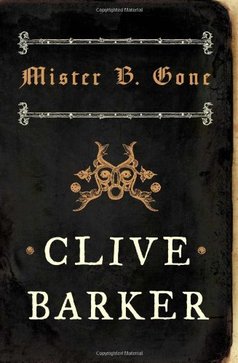MISTER B. GONE BY CLIVE BARKER
25/5/2015
People don't like this book. Barker fans don't like this book. This is because it is not “Barker,” at least, not as the man's readership has come to expect. This has none of the weight or slow-building mythology of previous titles; none of the resonant metaphysics or deviant sexuality. This is an entirely different stripe of story; one that is written by a different man; one transformed by time and experience. That it is not what has gone before seems to be the principle criticism aimed at it; one that requires dissection to understand its illegitimacy: Taken on its face, Mr. B. Gone is a surreal experiment; one tonally and stylistically removed from anything Barker has ever attempted before. For one thing, it's funny; laugh out loud, at times; the vulgarity and obscenity mingled with a gallows humour, not least of which due to the narrating voice of book-bound demon, Jakabok Botch, who regards the world around him with a sardonic distance, as though his being constitutes little more than a metaphysical joke (the punchline of which comes with his ultimate fate, the product being the book itself). He is far, far removed from Barker's usual protagonists, who tend to be normal men or women who find their lives and presumptions turned upside down by the discovery of miracles (dark or otherwise). Jakabok, by contrast, is a demon; a lesser species of Hell-spawn, more pathetic than he is fearsome, perpetually manipulated, brutalised, swept along by events, until he eventually arrives at the state of nihilism that sees him bound; not even able to die and find some solace. Within his prison's pages, he recounts moments of bitterness and abuse; moments of revelation and affection; moments of sadism and obscenity (as befits his born nature), all of them co-mingled in an almost Gaiman-esque stew, the enjoyment of which depends on taking the work for what it is rather than what one demands of it. A rag-doll work, then; one comprised of various elements, all drawn from different sources and exhibiting different qualities. This can lend the whole affair a patchwork quality, especially when the tone shifts from scene to scene; romanticism shifting to abuse and abandonment, abuse and abandonment giving way to Barker's trademark philosophical observations. It is a work that requires readjustment of expectation to appreciate fully, not to mention the ability to separate oneself from desire (would it be wonderful to have a concluding book to Galilee or another instalment of The Books of the Art? Certainly, but one must bear in mind: the writer who created those is long gone; even if such works occurred, they would likely be closer in nature to Mr. B. Gone than any that have gone before). A fairly successful central conceit; that of a book possessed; which anticipates your reactions to its confessions...a book which speaks to you directly, begging, flattering, ultimately threatening...Jakabok is more than a passive protagonist whose adventures you consume: he speaks to you directly from the page, following your eyes across it and making demands of you that most would not. This lends the book a degree of engagement akin to that in a video game; you are somewhat more invested than you might otherwise be, since Jakabok involves you directly in his narrative as his possible means of salvation. The first line - “Burn this book.”- resonates throughout the entire story, and also serves to enhance the pace and emotion when it comes to moments of intensity. Plot wise, the book skips and skims over a period of settings and centuries, from the circle of Hell where Jakabok first finds himself, across central Europe where he learns to be far more than he was born to. Again, this is more a series of moments than an interconnected narrative; many are more or less self contained; little confessions and reflections that Jakabok feels inclined to share, with his ultimate fate something that could have easily been a short story in its own right. The reader's individual enjoyment of the work will largely depend on their taste in this regard; anyone looking for the more cohesive, flowing narratives that predominate Barker's previous works will not find one here; there is a lightness and a freeness to both prose and structure that sometimes border on the poetic or stream-of-consciousness, a factor which may prove as alienating for some as it will engaging for others. As to the closing chapters, the book ends in the same jocular vein as it began; with a kind of gallows punchline, in which the ultimate weapon over which both Heaven and Hell meet to squabble reveals itself to be something familiar to any who pick up and read the book, and all of Jakabok's pretences; his claims of power and potential, his threats of torture and mutilation, should you not comply with his demands, are revealed as shams. Barker himself has gone on record as stating that “...this is a fun one,” a book that he never intended to have the weight or density of previous works, and who could blame him?; After the metaphysical explorations and cultural commentaries of Imajica, Coldheart Canyon, The Great and Secret Show, Sacrament, Everville, there is very serious danger that he could find himself retreading old ground; similar images, similar conceits and conclusions. Mr. B. Gone, along with the children's series, The Abarat, mark a significant departure from anything Barker has attempted before, but, as a wise man once said: “...different doesn't mean bad. It just means different.” GEORGE LEA Follow the links below for more great horror reviews HORROR FICTION REVIEWSHORROR MOVIE REVIEWSTHE SCARLET GOSPELS REVIEW25/5/2015 11:26:52
Nice review, George. 12/8/2015 14:39:19
The essay ought to be such that it can mirror the real circumstance through a range of contemplations, in a way which can keep the interest and truths on the same pontoon. Comments are closed.
|



 RSS Feed
RSS Feed


